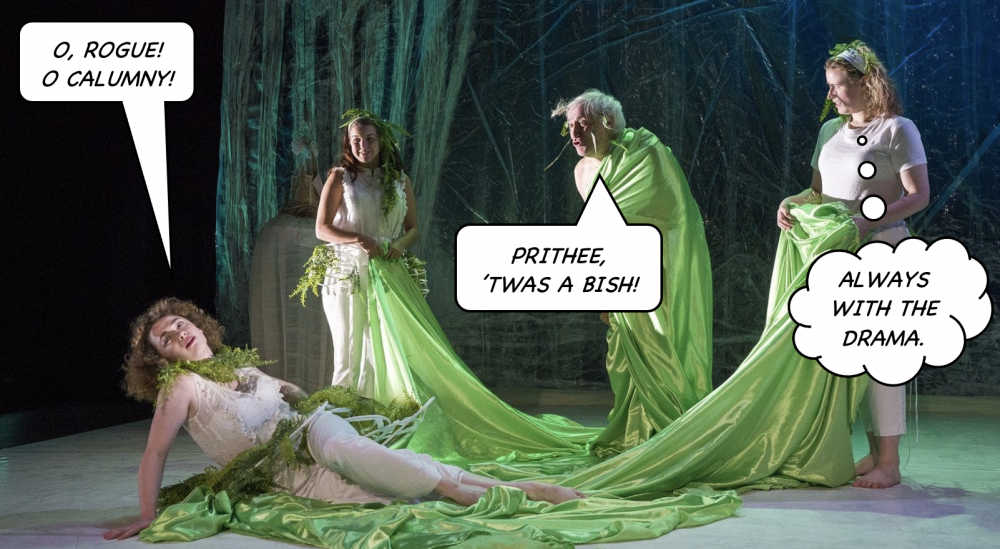Otto’s razor: Difference between revisions
Amwelladmin (talk | contribs) No edit summary Tags: Mobile edit Mobile web edit |
Amwelladmin (talk | contribs) No edit summary |
||
| (7 intermediate revisions by the same user not shown) | |||
| Line 1: | Line 1: | ||
{{a|work| | {{a|work| | ||
{{image|Drama and mistake|png|''[[Die Schweizer Heulsuse]]'' at the Donmar Warehouse during Lockdown}} | |||
}}{{dsh razor quote}} | }}{{dsh razor quote}} | ||
A rule of thumb, attributed to 19th century Austrian plowright {{buchstein}}, in his play {{Dsh}} ([[Die Schweizer Heulsuse|“The Swiss Milquetoast”]]) that recommends when there are plausible alternative explanations for | A rule of thumb, attributed to 19th century Austrian plowright [''playwright? — Ed''] {{buchstein}}, in his play {{Dsh}} ([[Die Schweizer Heulsuse|“The Swiss Milquetoast”]]) that recommends when there are plausible alternative explanations for an outcome, one should choose the simplest-''minded'', preferring cloth-headedness or coincidence over the artful application of high-mindedness, intelligence or inspiration. | ||
Otto’s razor is a corollary to [[Hanlon’s razor]]: where Hanlon cautions against imputing malice where incompetence would do, {{buchstein}} cautions against awarding ''credit'' where a ''fluke'' would do. | |||
{{ | {{quote| | ||
{{otto’s razor}}}} | |||
Putting the two razors together (“[[Büchstein’s twin-blade razor]]”) we get the following: until the contrary is proven, treat both the pinnacles of success and the chasms of calumny as the product of ''accident'' and not intention. Give the benefit of the doubt to wrong-doers for deeds that present as wilful, and withhold it from do-gooders for their strokes of uncommon fortune, until there is no other realistic way of explaining them. | |||
{{dsh}} was a light-hearted comic farce, but (until the dengue fever got him) [[Büchstein]] took his aphorism seriously — he would credit it, when drunk, to Goethe, Schiller or even Aristotle — and would gleefully point out to disbelieving dinner guests celebrated monuments to human triumph and notorious stains of monstrous wickedness that in fact came about by more or less fortunate adjacency and not intelligent design. | |||
The twin-blade razor is a healthy sceptical disposition to take into the world. [[Paula Vennells|Those who find uncommon success that defies outward explanation]] would do well to bear it in mind. | |||
In a sad irony, by the time his “razor” caught on, [[Büchstein]] was deep in series of debilitating, Papaya-juice inflected hallucinations from which he did not recover.<ref>A poultice made from a preparation of papaya and coconut was a popular treatment for Dengue fever at the time.</ref> | In a sad irony, by the time his “razor” caught on, [[Büchstein]] was deep in series of debilitating, Papaya-juice inflected hallucinations from which he did not recover.<ref>A poultice made from a preparation of papaya and coconut was a popular treatment for Dengue fever at the time.</ref> | ||
{{Sa}} | {{Sa}} | ||
*[[Hanlon’s razor]] | |||
*[[Occam’s razor]] | *[[Occam’s razor]] | ||
*{{ | *{{otto}} | ||
{{ref}} | {{ref}} | ||
Latest revision as of 09:41, 4 June 2024
|
Office anthropology™
|
Herculio: ’Tis neither malice, spite, nor virtue
Whose ledger swells, or plucks, the seedy fruits of progress —
But mainly accident.
Lest thee with surety know aught else —
Withhold thy assignations.
Triago: Pish upon thee, Nuncle. Pish!
Dost thou mean to say
Things peel this way
Through doughty misadventure?
Herculio: Peradventure —
Triago: Pish abeam!
Has thou no more to say than that?
Wouldst thou on this shaky surmise
Withhold rebuke?
Herculio: Perchance, per case, mayhap dear Triago
’Twas but a fluke?
Triago: O! This nuisant planet weighs upon my soul!
Herculio: If ’tis this and nought beside
That flies you to a vernal rage
Our fickle globe in its manifold confound’ry
Lies prettily indeed
For thy alignment.
A rule of thumb, attributed to 19th century Austrian plowright [playwright? — Ed] Büchstein, in his play Die Schweizer Heulsuse (“The Swiss Milquetoast”) that recommends when there are plausible alternative explanations for an outcome, one should choose the simplest-minded, preferring cloth-headedness or coincidence over the artful application of high-mindedness, intelligence or inspiration.
Otto’s razor is a corollary to Hanlon’s razor: where Hanlon cautions against imputing malice where incompetence would do, Büchstein cautions against awarding credit where a fluke would do.
Never attribute to virtue something that could equally be attributed to self-interest; never attribute to skill something that could equally be attributed to dumb luck.
Putting the two razors together (“Büchstein’s twin-blade razor”) we get the following: until the contrary is proven, treat both the pinnacles of success and the chasms of calumny as the product of accident and not intention. Give the benefit of the doubt to wrong-doers for deeds that present as wilful, and withhold it from do-gooders for their strokes of uncommon fortune, until there is no other realistic way of explaining them.
Die Schweizer Heulsuse was a light-hearted comic farce, but (until the dengue fever got him) Büchstein took his aphorism seriously — he would credit it, when drunk, to Goethe, Schiller or even Aristotle — and would gleefully point out to disbelieving dinner guests celebrated monuments to human triumph and notorious stains of monstrous wickedness that in fact came about by more or less fortunate adjacency and not intelligent design.
The twin-blade razor is a healthy sceptical disposition to take into the world. Those who find uncommon success that defies outward explanation would do well to bear it in mind.
In a sad irony, by the time his “razor” caught on, Büchstein was deep in series of debilitating, Papaya-juice inflected hallucinations from which he did not recover.[1]
See also
References
- ↑ A poultice made from a preparation of papaya and coconut was a popular treatment for Dengue fever at the time.
